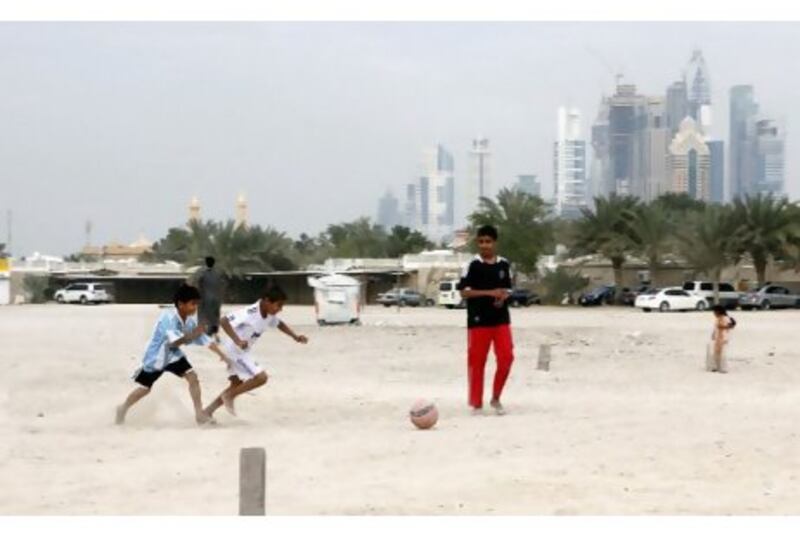DUBAI // Mohammed Shdadi, an 80-year-old police gardener, never expected to live on a sand lot littered with cinder blocks, broken tiles and an old car with a missing window.
But previous attempts to house his family of eight on a Dh4,500 salary as a gardener for the Dubai Police had fallen through. So this past summer he turned to his employers, and they gave him a three-bedroom home in Shaabiyeh Shurtat, roughly translated as Police Neighbourhood, for Dh350 a month.
"When I first came, the house was falling apart," he said. He painted it and borrowed Dh9,000 from friends to buy faded furniture and an air-conditioning unit.
Mr Shdadi is one of hundreds of police and army employees allowed to live for little or no rent in a few neglected sand-covered blocks near the First Interchange on Sheikh Zayed Road, the site of a former military compound.
The decades-old neighbourhood, now surrounded by sprawling Jumeirah villas and in the shadow of the Burj Khalifa, is home to many Emiratis, as well as families from Oman and Yemen.
Near the Shaabiyeh Shurtat is the Shaabiyeh Defaa, or Defence Neighbourhood. It has fewer sand pits and comes with covered parking in the form of corrugated sheets of metal jutting out of homes.
Both districts feature low-slung concrete residences marked with graffiti and cracks. With as many as a dozen family members living in one house, a good number of residents sleep four to a room.
They seem to manage. All the families spoken to owned at least two cars and had a maid. Flat-screen TV and BlackBerries were a common sight. In one family, three sisters had more than 100 pairs of shoes.
Many people who live here brighten their ageing homes with fresh paint. Shoq Mohammed, a 29-year-old human resources employee, had splashed her walls in magenta and yellow when she moved into Defence Neighbourhood a year ago. Within eight months she had to redo them, because huge cracks had broken through and rainwater leaked into the home.
She and her husband, Khalil, a 29-year-old Emirati mounted policeman, brought their seven children here when Khalil's uncle left to move into a villa in Barsha.
The boys sleep in a bedroom painted yellow, the girls and a maid in a pink room, and she and her husband in the third, soon, said Shoq, to be purple.
The house costs less than their previous flat, and offers more space for the children to run around. "Here they can play outside and make friends," Shoq said.
People who have lived in the area a long time feel a sense of community. At dusk, boys play football outside and lean against cars, chatting. Many father and sons work for the same department.
"I know all the families here," said Mohammed, a 28-year-old Emirati who works for the police as a bodyguard and grew up here with his seven siblings. His father also works for the police department.
"It's old, I know. But here, everyone sits together," he said, as he cruised over the sand in his Nissan Tiida. "In a big house, you are all alone."
Ahmed Rashid Ghanim, 35 and Emirati, said he likes raising his four children in the Defence Neighbourhood where he grew up.
In recent years his parents expanded their rent-free home to accommodate their grandchildren along with three daughters and two maids.
During an evening visit, the family watched an Indian film in the living room under a low, uneven false ceiling. Down a narrow hallway to the bedrooms someone was praying. Young ones ran out the living room door through the kitchen and outside to play in the sand.
"If you live in a house, you'll always worry that your children will fall down the stairs," Mr Ghanim said.
Still, he and others would not mind an upgrade.
A few months ago Mr Ghanim applied for a new home from the government housing program for locals, though he has no idea how long it might take.
His wife, Mona Jasim, a 34-year-old Emirati, worries their family of 11 will outgrow the property. She and other residents have also heard for years that the neighbourhood will be demolished, perhaps to make room for new villas.
"We are just sitting and waiting," she said.






